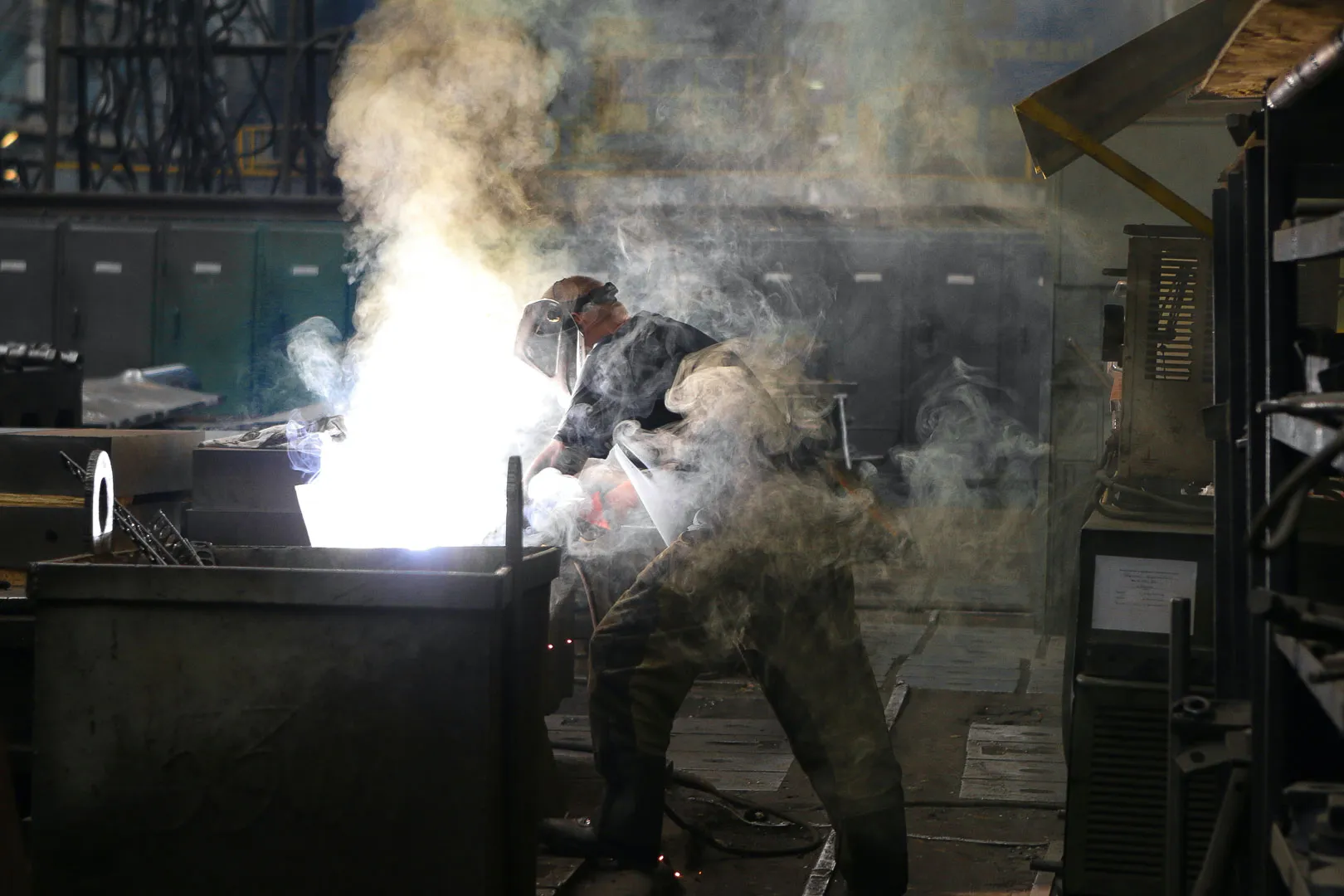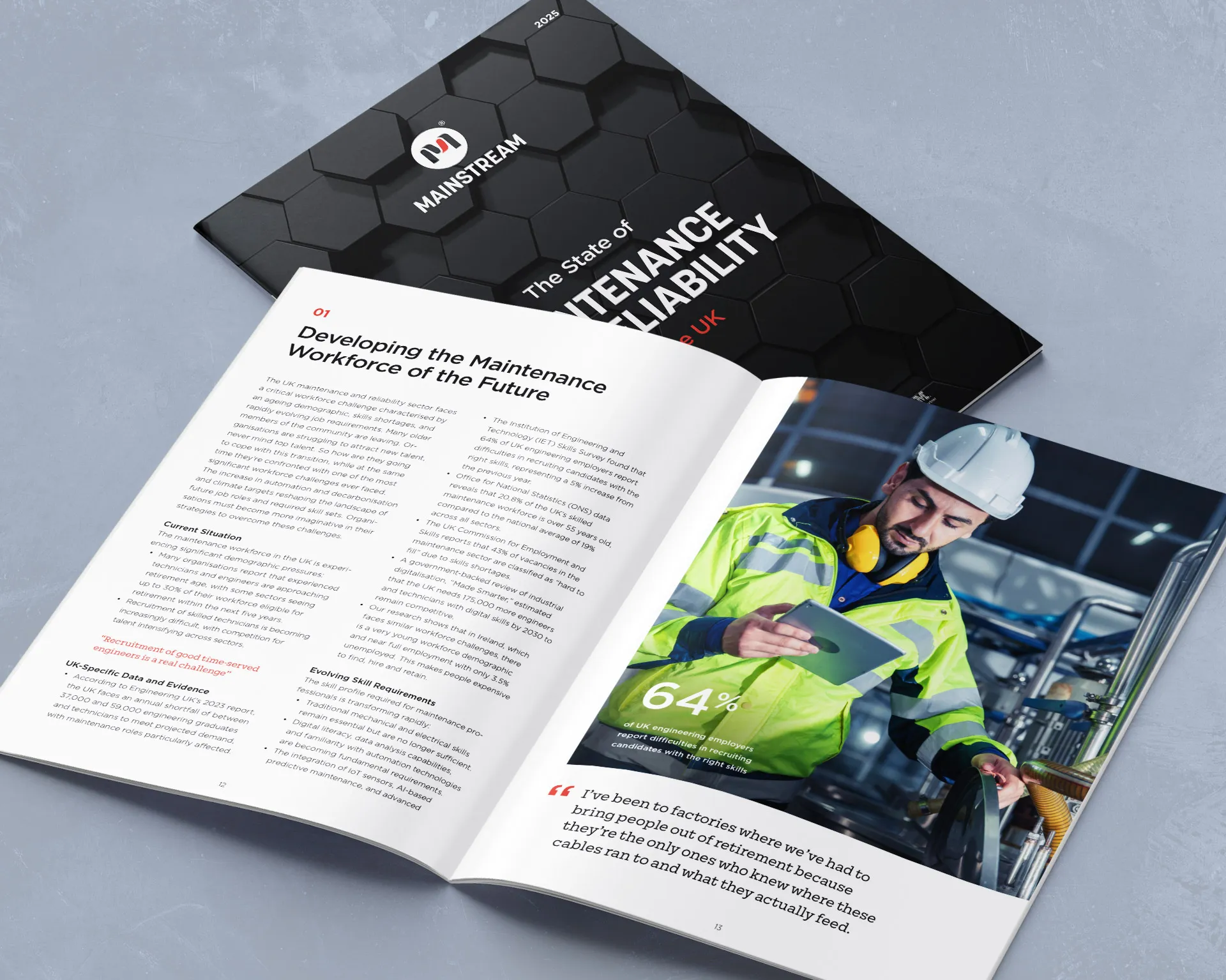Topics
The MAINSTREAM research team polled our community of thousands of Maintenance and Reliability professionals to glean distinctive insights into challenges faced, and the opportunities on offer, in their quest for achieving maintenance and reliability excellence. These hot topics drive an agenda designed to help leaders and teams understand best practices, compare their companies’ performance and working environment to those inside and outside their industry, and make informed and effective decisions.

Developing the Maintenance Workforce of the Future
The UK maintenance and reliability sector faces a critical workforce challenge characterised by an ageing demographic, skills shortages, and rapidly evolving job requirements. Many older members of the community are leaving. Organisations are struggling to attract new talent, never mind top talent. So how are they going to cope with this transition, while at the same time they’re confronted with one of the most significant workforce challenges ever faced. The increase in automation and decarbonisation and climate targets reshaping the landscape of future job roles and required skill sets. Organisations must become more imaginative in their strategies to overcome these challenges.
Converting Fragmented Asset Data into Actionable Insights
Data management and utilisation challenges span collection, quality, integration, and analytical capabilities. The ability to accumulate data has increased over recent years due to advances in digital technology, improved monitoring capability and ever-expanding fields within maintenance and reliability systems and databases. Organisations not only struggle with the volume of data, but also consolidating the data from disparate systems, and then transforming it into actionable insights that foster organisational change and lead to more advanced discussions and decision-making.
Decreasing Quality and Integrity in Work Management Fundamentals
A concerning trend across UK asset-intensive organisations is the erosion of foundational work management practices. This decline threatens to undermine more advanced asset management initiatives by weakening the essential operational processes upon which they depend. We must get back to basics, understand and adhere to maintenance planning, reporting, scheduling, work execution, spares management, and performance assessment and management. Compounding the situation, the declining integrity of maintenance work is leading to a deterioration in asset condition and health. There is a collective agreement about a drop in the quality of basic solid work management fundamentals. We must get back to basics, understand and adhere to maintenance planning, reporting, scheduling, work execution, spares management, and performance assessment and management. Compounding the situation, the declining integrity of maintenance work is leading to a deterioration in asset condition and health.
Misalignment Between Asset Strategy and Company Strategy
A significant obstacle to maintenance and reliability excellence in the UK is the frequent disconnect between asset management approaches and broader organisational objectives. This misalignment prevents organisations from optimising their asset investments and activities to deliver maximum business value. Maintenance and Reliability leaders are asked to articulate and define value contribution from investment. This is complex as there is not a simple linear relationship to value, and organisations have different perceptions of what value is as it pertains to their strategic needs.
Securing C-Suite Support and Budget for Asset Management Initiatives
UK maintenance and reliability professionals consistently struggle to gain executive-level support and adequate funding for their initiatives. While experts in equipment reliability, there is often a mismatch in articulating ROI, risk mitigation, and strategic advantages in the financial language that drives executive decision-making and budget allocation. This challenge reflects both communication barriers and competing priorities at the highest organisational levels.
Breaking Reactive Maintenance Culture Despite Organisational Resistance
The human and organisational aspects of maintenance and reliability present some of the most persistent challenges. Cultural barriers and change resistance frequently undermine otherwise well-designed improvement initiatives. In many organisations there remains a struggle with entrenched reactive maintenance cultures where breakdown heroes are celebrated while prevention is undervalued. Organisational silos, leadership turnover (averaging 3.2 years), and poor stakeholder alignment undermine improvement efforts, with 83% of initiatives failing beyond 18 months. Most companies still incentivise reactive work. Companies with collaborative cultures achieve higher OEE, yet most lack the change management capabilities to transform these deeply embedded cultural barriers.
Navigating AI and Tech Options Without Clear ROI Pathways
Never has there been more technological options for maintenance and reliability practices, with artificial intelligence and other advanced capabilities promising transformation but often delivering mixed results. Technological breakthroughs in asset management are reshaping maintenance and reliability paradigms. In most cases, we need to respectfully temper the enthusiasm for the next shiny object and focus on getting bang-for-your buck or solving a pressing business need. It was generally agreed that great use cases and good business outcomes are the exception rather than rule.
The Impact of Decarbonisation on the Asset Manager
The UK’s commitment to net zero carbon emissions by 2050 creates profound challenges for asset-intensive organisations, requiring fundamental rethinking of asset strategies, technologies, and capabilities. It’s a once in history challenge. Maintenance and reliability leaders are essential in helping organisations navigate the transition to a more sustainable and climate-resilient future. We need to create a skill base that can cope with modern technologies while complying with a changing regulatory land scape in the context of decarbonisation and aggressive targets.
Significant Loss of Institutional Knowledge as the Workforce Ages
With 27% of UK maintenance engineers over 55 and 38% of technical experts retiring within 5 years, organisations face critical knowledge loss costing £240,000 per departing specialist. Despite most organisations recognising this risk, very few have formal knowledge transfer programs. Specialised knowledge takes a long time to develop. Organisations often resort to rehiring retirees, as ageing assets’ history exists primarily in workers’ memories, threatening £87 billion in infrastructure assets.
Escaping Firefighting Cycles to Build Sustainable Reliability Practices
UK organisations struggle to break free from reactive maintenance cycles despite clear evidence supporting proactive approaches. Production pressures, resource limitations, and accumulated backlogs create perpetual firefighting, while organisational culture celebrates breakdown heroes rather than preventative work. The transition to proactive maintenance faces significant barriers: difficulty quantifying avoided failures, insufficient planning capabilities, resistance to methodologies like RCM, and limited data for predictive modelling. This reactive pattern both causes and reflects deeper asset management limitations across British industry.

The State of Maintenance and Reliability in the UK
Download your sentiment report exploring the immediate and
relatable challenges, opportunities, and uncertainties confronting
Maintenance and Reliability Leaders and their teams.









